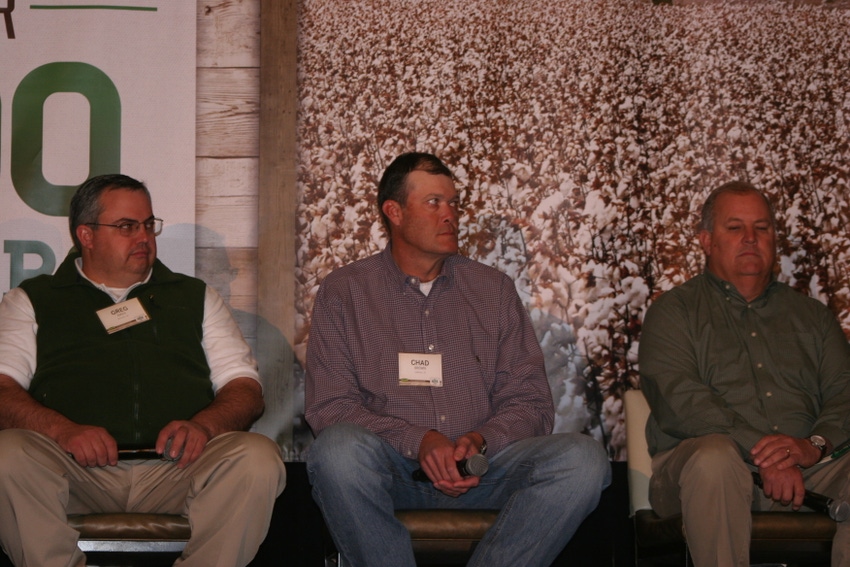January 18, 2015

USDA’s decision to deregulate the dicamba-tolerant trait in cotton and soybeans moves farmers a step closer to having a new tool for controlling Palmer amaranth and other economically troublesome weeds.
Cotton and soybean producers are now awaiting an announcement by EPA on Federal Section 3 registrations for two new dicamba formulations – Mon 1661 from Monsanto and Engenia from BASF – that can be applied over the top of cotton and soybeans containing the dicamba-resistant trait.
The new traits will be marketed as Roundup Ready 2 Xtend soybeans and Bollgard II Xtend Flex cotton. Monsanto has indicated it could launch five new Bollgard II Xtend Flex cotton varieties if the new dicamba formulations are approved by EPA in time for the 2015 season.
“This announcement marks an important milestone for farmers around the world,” said Robb Fraley, Monsanto’s chief technology officer. “Weeds represent a key pest to agriculture operations around the world and limit crops of much-needed nutrients, sunlight and access to available water resources. We’re excited to provide additional tools that can help improve efficiencies on farm and support farmers in bringing more food to harvest for consumers.”
Monsanto has been working diligently over the last ten years to develop the Roundup Ready Xtend Crop System and bring it to market. “The dedication, effort and number of people that have touched this project has been extraordinary, and demonstrates our continued commitment to bring a range of agriculture solutions to farmers – including game-changing traits like Roundup Ready 2 Xtend soybeans and Bollgard II XtendFlex cotton,” said Fraley.
“BASF is committed to providing new technologies for growers, as shown by our $1.5 million per day investment in agricultural research,” said Scott Kay, vice president, U.S. Crop Protection, BASF. “Through our continued commitment to innovation, BASF will bring to market its most advanced dicamba formulation, Engenia herbicide,” pending regulatory approval.
Related
Deltapine planning to launch two flex and five XtendFlex cotton varieties in 2015
Engenia to offer most advanced dicamba formulation available
BASF and its legacy companies have been involved in the marketing of dicamba formulations, first with Banvil and later with Clarity, for decades. The new Engenia formulation is designed to significantly reduce drift and improve the efficacy of the herbicide.
Public commentary
The USDA opened public commentary in the fall of 2014 regarding the trait deregulation. According to the feedback on www.regulations.gov, growers believe technologies like dicamba-tolerant cropping systems give farmers choices. Growers stated the technology is necessary so they can continue to improve their farms and remain competitive in the global marketplace by maintaining healthy yields and productivity.
“Today’s decision by USDA to deregulate Dicamba is great news for American soybean farmers. In almost all of our 30 soy-growing states, farmers face a strong foe in herbicide-resistant weeds, and this technology presents another mode of action with which we can combat this issue,” said ASA President and Brownfield, Texas, farmer Wade Cowan.
“We appreciate USDA’s work on this issue and encourage them to continue addressing our industry’s need for a more reliable biotech approvals process. We turn our attention now to the final registration of the Dicamba product label at EPA, and then to approvals in key soybean export markets like China, so our farmers can fully implement this technology on their farms.”
Because of the importance of export markets to U.S. soybean farmers, ASA has a long-standing policy requiring technology providers like Monsanto to seek and obtain approvals in key U.S. soy export markets prior to commercializing those traits domestically. ASA works closely with technology companies, fellow members of the soy value chain and government entities to facilitate timely, science-based reviews of new biotech soybean traits both domestically and abroad.
USDA’s Animal & Plant Health Inspection Service announced its determinations of non-regulated status for Monsanto’s soybeans and cotton that are resistant to certain herbicides, including dicamba, on Jan. 15.
Registration next step
Notice of these determinations will be published in the Jan. 20 Federal Register. Copies of the petitions, determinations and other supporting documents are on the USDA’s Biotechnology Regulatory Services web page at www.aphis.usda.gov/biotechnology/news.
This decision to deregulate dicamba cotton means that the company is now free to transport, process, package and distribute seed of this new technology. Industry observers say EPA will make its proposed regulatory decision in the coming months. Dicamba may not be used on these crops until EPA has approved the use on the label.
Engenia, BAFS’s new dicamba formulation has been shown to be effective in controlling more than 190 broadleaf weeds, including glyphosate-resistant weeds such as Palmer amaranth or pigweed.
In more than 300 research trials completed in 2011 and 2012, Engenia herbicide demonstrated effective control of resistant broadleaf weeds. When Engenia herbicide is used with other BASF residual herbicides, it has shown more than 95 percent control of both grasses and problematic broadleaf weeds.
To prepare for commercialization and to further enhance growers' experience with the technology, Monsanto trained more than 7,500 growers, retail partners and stakeholders on weed management. For more information about the Roundup Ready Xtend Crop System, visit www.XtendCropSystem.com.
“BASF has leveraged more than 50 years of technical expertise with dicamba to develop Engenia herbicide,” Kay said. “Engenia herbicide will provide a much-needed new tool to help growers manage weed problems in dicamba-tolerant cotton and soybeans.”
For more information on herbicide best practices, please visit http://agro.basf.us/stewardship/herbicide-best-practices.html.
About the Author(s)
You May Also Like






